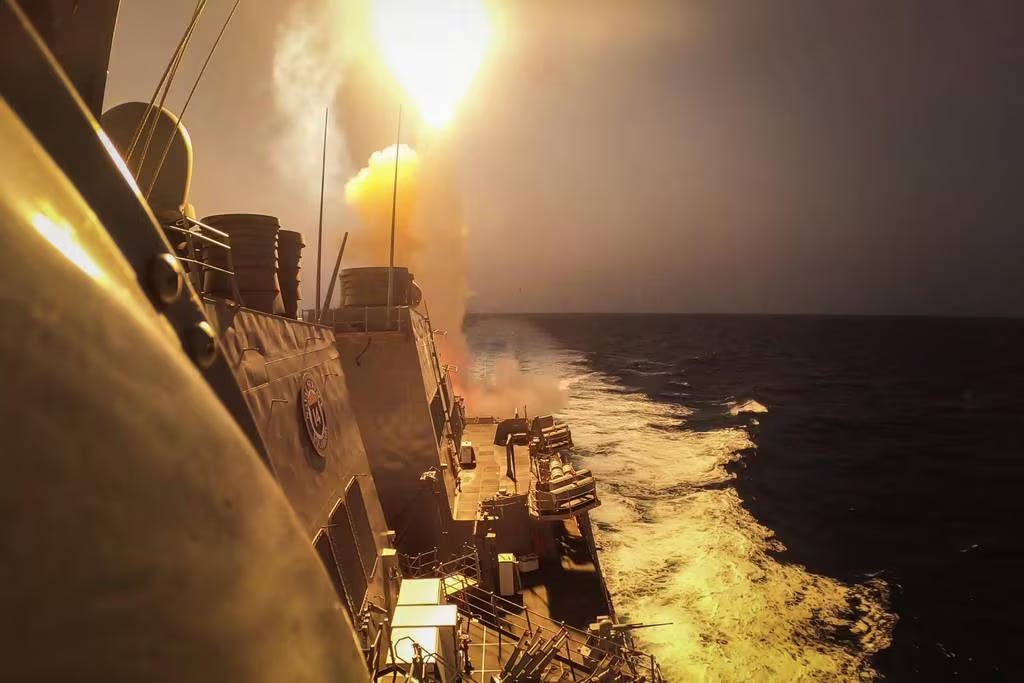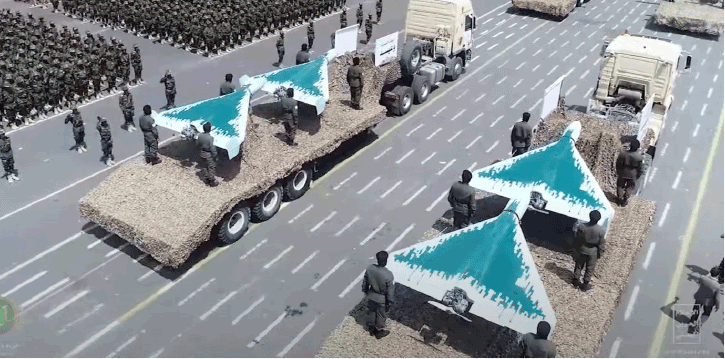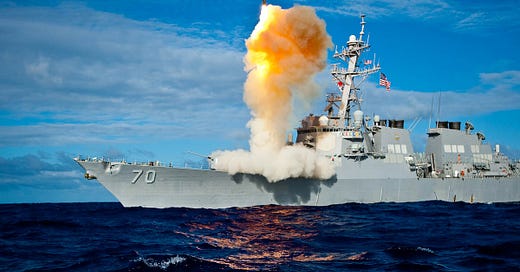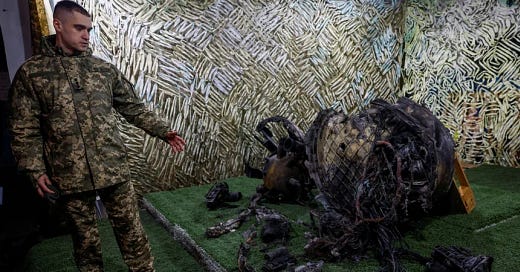
Discover more from Weapons and Strategy
The Houthis Tried a Swarm Attack and It Didn't Work
Expect even more attacks in future from the Houthis and in Iraq and Syria
On Saturday, December 16th, the Houthis launched a swarm attack of Kamikaze drones (aka loitering munitions). The USS warship, the USS Carney, shot them all down. Reportedly the attack involved 14 drones.

CENTCOM (for Central Command that has responsibility for the Middle East) acknowledged the swarm attack but officially would not say if the swarm attack was aimed at the USS Carney.
CENTCOM did not announce the type of drones used, but most likely they were Iranian Shahed-136 models. This is the same type of drone that the Iranians provided to Russia. They are now manufactured in Russia with the name Geran-2. It has a range of 1,000 miles (in the Russian variant) and carries a 50 kg (110 lb.) warhead.
The original Shahed used by the Houthis does not have a camera, so it has to be guided visually by the land operator or otherwise uses GPS programmed with a predefined target. That method is of no use against moving targets. The working assumption is that the Houthis are guiding them from land.
The Houthis are also using rockets and cruise missiles trying to attack ships in the Red Sea.
The situation has become so fraught that some international shippers have suspended operations and are no longer sending ships through the Suez canal.
Despite the blatant nature of Houthi attacks, the Biden administration has steadfastly refused to go after Houthi military assets, including launch sites (for missiles) and command centers. The only response of the US and its allies carrying out freedom of navigation security exercises in the Red Sea and Persian Gulf is to try and knock out drones and missiles launched by the Houthis by shooting them out of the air.
A number of commercial tankers and bulk carriers, as well as one container ship, have been hit by Houthis attacks. So far there are no known casualties, but a few of the ships have sustained enough damage to be escorted to friendly ports for repairs.
There are no reports on the extent of Houthi weapons' stockpiles. However, if it at all resembles the thousands of missiles given to Hamas and Islamic Jihad by the Iranians, then the Houthis are not likely to run out of weapons any time soon.
The US position is it does not want to see the war in the Middle East widen. Yet the Houthi attacks have profound implications, just as do the Jihadist attacks in Syria and Iraq.
As of Friday, December 15th, US facilities in Iraq (including the US Embassy) and Syria have been attacked by drones and short range rockets 98 times since October 17th (46 attacks on forces in Iraq, and 52 on forces in Syria). The US has barely responded to the attacks even though US forces in the region are more than able to do so.
In the Middle East if you don't respond to active threats it usually means two things: the enemy will launch even more deadly attacks in future and the enemy will feel safe from any retaliation. In this context the US actually is encouraging more attacks both in Syria and Iraq and in the Red Sea.
CENTCOM has made clear, as has the Pentagon, that Iran is behind the attacks and is orchestrating them, as well as providing the weapons and know-how to their proxies. Yet the US has not made any hard demands on Iran. In fact, the Biden administration has released billions of dollars to the Iranians even while these attacks are taking place. There are plenty of Iranian assets that could be targeted as a punishment for Iran's recklessness, yet none have been.
Meanwhile on December 18th Secretary of Defense Lloyd Austin and Joint Chiefs Chairman C.Q. Brown are heading to Israel trying to persuade the Israelis to significantly reduce (if not suspend) their operations in Gaza, largely on the grounds Washington wants to avoid a wider war with Iran. It seems Washington's support for Israel is secondary to Washington's foreign policy regarding Iran.
If there is any good news it is that the USS Carney was successful in shooting down 14 Houthi drones in what has been described as a swarm attack. One wonders whether the next swarm attack will be even bigger? One also wonders whether we can count on zero casualties in the Red Sea and limited casualties in Iraq and Syria? The short answer is it would be very unwise and bad policy to leave our forces exposed to Houthi or Jihadist attacks.
Most criticism of the Biden administration's handling of the ongoing events has been muted, largely because of the lack of casualties so far. That will change if a disaster happens.

















The Biden’s care no more about American lives than they do about Israeli or any others.
"There are plenty of Iranian assets that could be targeted as a punishment for Iran's recklessness, yet none have been."
The lives of our lads in Iraq and Syria might get more interesting.